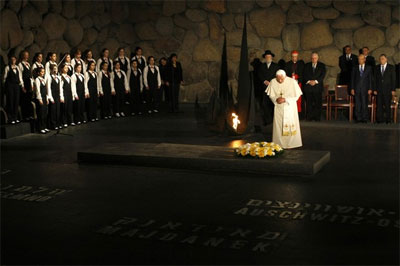Visiting the Holocaust Museum is a
difficult subject, especially in Israel. Unlike many museums which
are houses of a people's history and triumph, this museum is a walk
through a people's history and suffering. The Holocaust stands as a
mark of identity for modern-day Jews just as World War II stands as a
mark of identity for most Westerners of the past three generations
(born 1910-1995).
We are now moving into the third and
fourth generations past the Holocaust and WWII, where things such as
“Nazi” and “Communist” and people such as Hitler and Stalin
have become more of a byword than a warning for future generations.
Many people are all too likely to associate government actions with
the Nazi party and many people are just as ready to roll their eyes.
When visiting Yad Vashem (the site of
the Museum) I entered with a reverent and somber silence, in my mind
befitting such a chapter of our human history. I found it odd, then,
to find teenagers in there laughing, boyfriend and girlfriend
attempting to have an intimate moment in the shadow of child torture,
or as some friends cited, a teenager goosestepping out of the museum.
This is our humanity: how quickly we
forget, how quickly we stop caring.
As we all grow older and as time
marches forward we find how chilling and correct these words are:
“For of the wise man as of the fool there is no enduring
remembrance, seeing that in the days to come all will have been long
forgotten” (Ecc 2:16a).
 |
| Part of the ministry of Yad Vashem is to give some sort of remembrance to the names and people who were lost. |
It's easy to blame these kids, but such
is the time, era, and maturity we all came from. Some grow up to
recognize immaturity, others grow into immaturity.
One important lesson I took from the
Holocaust and the museum is prefaced by the following statements:
1) Ordinary men and women did horrible
things out of fear, vice, coercion, and sometimes all three.
2)Both religion and science were used as
tools to carry out this exercise; any blame of one or the other would
be dishonest and folly.
The important lesson to take from such
a chapter of our history is to see ourselves in that history. This is
not to see you or I caused the Holocaust, but to see how, in the
human condition, vice and sin caused it, as it causes the greatest
tragedies.
Fear keeps us from doing good, but vice
helps us to spread evil. Many will say, “I haven't killed anyone, I
haven't stolen anything. I'm a good person!” History seems to say,
“Just give yourself a chance.”
How easy it is to call ourselves
enlightened, intelligent, and wise in the face of such things. It
would be unwise to see the little evils we allow in our own lives as
“good” just because they aren't “really bad.” The road to
great evils begins with tolerating small evils. In my mind the
easiest source of determining evil begins with the dignity of the
human person.
In any era and in any place the first
people to suffer, in good times or bad, are the ones who are despised
and defenseless. This can be the unborn, the abused, the poor,
addicts, or the mentally disabled. Furthermore they can be, in the
right circumstances, those imprisoned, homosexuals, religious, or
even a-religious.
Many evils are carried out for greater
goods or ideologies that don't need wrinkles—and while it's easy to
blame religion alone in this sphere, anything secular or otherwise
would subscribe to folly if they thought it was true.
Even more evils are carried out because we lack the ability to forgive and seek forgiveness. An open wound festers, but a bound wound has a chance to heal. I find that this is the hardest thing to learn: forgiveness and self-forgiveness.
Humanity likes to see itself in great
triumphs and accomplishments, but it's much harder to look in the
mirror when it's something disfigured and horrible. But in looking
upon it there is also healing. In accepting the evil we do and
converting from it there is progress.
We rightly pray this Lent for mercy
because we need it, and we know we do. “My sacrifice to God is a
contrite spirit, a humbled and contrite heart you will not spurn”
(Ps 51:17).
 |
| This Lent say a special prayer for the many families and lives ruined or lost by war and evil. |
No comments:
Post a Comment